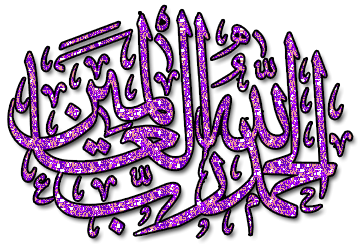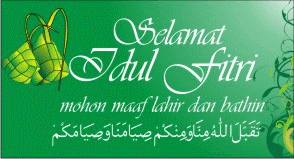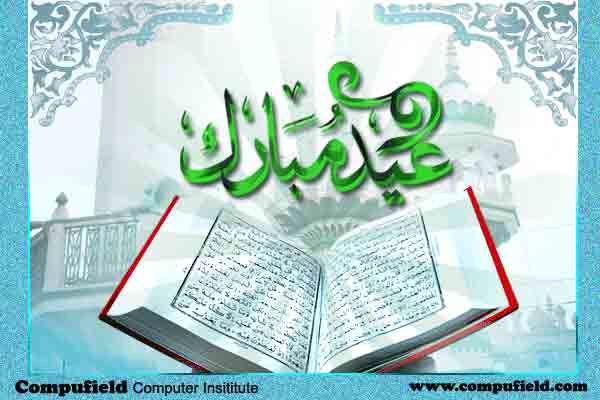 (May Peace, Mercy and Blessings of Allah be on all of you)
(May Peace, Mercy and Blessings of Allah be on all of you)Eid means "Festivity" or "Celebration" and Fiter means "To break the Fast" "(Malik's Muwatta Book 10, Number 10.2.5), so the Eid ul Fiter may be taken as the 'Celebration of breaking Fasts' as Muslims celebrates it at the end of the fasting month Ramadan, on the very first day of Shawwal (then next month in Islamic Calendar after Ramadan. Eid-ul-Fiter day depends on the moon as Islamic month may consist of 29 or 30 days but it has to be 1st Shawwal.
Narrated by Abdullah bin Umar (May Allah be pleased with him): Allah's Apostle (Peace be Upon Him) mentioned Ramadan and said, "Do not fast unless you see the crescent (of Ramadan), and do not give up fasting till you see the crescent (of Shawwal), but if the sky is overcast (if you cannot see it), then act on estimation (i.e. count month of Sha'ban or Ramadan as 30 days)." (Bukhari, Volume 3, Book 31, Number 130).
The unique festival of Eid -ul -Fitr has its own significance which is not connected with any historical event, changes of seasons, cycles of agriculture or to any worldly affairs. Its significance is purely spiritual when the Muslims thank Allah for having giving them the will, the strength and the endurance to observe fasts and to obey His commandment during the blessed month of Ramadan. Eid-ul-Fiter is one of the most important festivals for Muslims. This is Mustahab (recommended but not obligatory) to wear the best available cloths on Eid day. (Silsilah Ahadith Sahiha, Lil-Bani, Number 1279).

Abu Huraira (Allah be pleased with him) reported that the Messenger of Allah (May peace Be Upon Him) forbade to observe fast on these two days. 'Id-ul-Adha and 'Id-ul-Fitr. (Muslim Book 006, Number 2534)
Ibn 'Umar (May Allah be pleased with him) said; Allah's Apostle (Peace be Upon Him) has made Sadaqat-ul-Fitr obligatory, (and it was), either one Sa' of barley or one Sa' of dates (and its payment was obligatory) on young and old people, and on free men as well as on slaves.(Bukhari, Volume 2, Book 25, Number 588)
Explanation: The Person who is not having the food for one day and night is free from Zakat / Sadaqat-ul-Fitr (Obligatory Charity Tax after Ramadan). [Tafheem-ul-sunnah seires # 9 Page 81 by Iqbal Kelani, Hadith Publications Lahore.]

For spending in the way of Allah i.e. charity etc means we will get the reward 700 times in sha' Allah (if Allah wills) plus in Ramadan we get 10 time reward for each good deed (Bukhari, Volume 3, Book 31, Number 118) so the reward for spending on charity in Ramadan is 700 x 10 = 7000. Zakat (Charity) is also one of the five pillars of Islam which is obligatory on each muslim who have wealth more than the the give limit. This obligatory charity tax is one Sa' means2,1/2 kg of eatable goods like wheat, rice, date or barley, you can give 2,1/2 kg of the said goods as per your choice / convenience to some poor. It should be paid minimum before one or two days of Eid-ul-Fitr so that poors and needies can also participate in the Eid celebrations happily.
Narrated by Nafi' (May Allah be pleased with him): Ibn 'Umar (May Allah be pleased with him) said, "The Prophet (Peace be Upon Him) made incumbent on every male or female, free man or slave, the payment of one Sa' of dates or barley as Sadaqat-ul-Fitr (or said Sadaqa-Ramadan)." The people then substituted half Sa' of wheat for that. Ibn 'Umar (May Allah be pleased with him) used to give dates (as Sadaqat-ul-Fitr). Once there was scarcity of dates in Medina and Ibn 'Umar (May Allah be pleased with him) gave barley. 'And Ibn 'Umar (May Allah be pleased with him) used to give Sadaqat-ul-Fitr for every young and old person. He even used to give on behalf of my children. Ibn 'Umar (May Allah be pleased with him) used to give Sadaqat-ul-Fitr to those who had been officially appointed for its collection. People used to give Sadaqat-ul-Fitr (even) a day or two before the 'Id. (Bukhari; Volume 2, Book25, Number 587).
The special prayer of Eid ul Fitr is offered in the morning of Eid besides the regular five obligatory prayers which is not recommended to delay; its time is just after sunrise.
Yazid bin Khumair Ar-Rahabi (May Allah be pleased with him) said: Abdullah bin Busr (May Allah be pleased with him), the companion of Allah's Messenger (Peace be Upon Him), once went with the people on the day of Eid (Fitr or Adha). He criticized the delay of Imam and said, "We used to be finished at this hour (and that was the time one could pray voluntary prayers i.e. just after sunrise)."(Sunan Abu Dawud, Vol1, Book of Salat, Number 1135).This is obligatory for all women / girls to for Eid prayer for participation in combine DUA of Muslims even if they can't perform their salah they need to go their to participate in DUA. (Bukhari Volume2, BOOK 15, Number 88).
This is Sunnah (the act of Prophet Mohammad Peace be upon him is known as Sunnah) to eat some dates in odd number before going to Eid prayer so it will be better if someone do that to fulfill sunnah.
Anas bin Malik (May Allah be pleased with him) said 'Allah's Apostle (Peace be Upon Him) never proceeded (for the prayer) on the Day of 'Id-ul-Fitr unless he had eaten some dates. Anas (May Allah be pleased with him) also narrated: The Prophet (Peace be Upon Him) used to eat odd number of dates. (Bukhari; Volume 2, Book 15, Number 73).

After Fajer prayer one should not perform any other prayer (Nawafil) before the Eid prayer, and on eid day. Eid prayer is 2 rakat (rounds). All Muslims must spend on charity as much they can afford to help other deserving people who cannot afford even their basic necessities. So those people can also celebrate and enjoy their eid.
Narrated by Ibn Abbas (May Allah be pleased with him): The Prophet (Peace be Upon Him) offered a two Rakat prayer on the Day of Id ul Fitr and he did not pray before or after it. Then he went towards women along with Bilal (May Allah be pleased with him) and ordered them to pay alms and so they started giving their earrings and necklaces (in charity). (Bukhari Volume 2, Book 15, Number 81)
While going to prayer place it is recommended to say Takbir till Imam's arrival.
Ibn e Umar (may Allah be pleased with Him) went out on 'Eidul-Fitr and 'Eidul-Adha, he would constantly make Takbir until he reached the prayer-place, then he would continue making Takbir until the Imam came. (Shafaee, Kitab ul Salat number 442)

Jabir ibn 'Abdullah (may Allah be pleased with him) reported that the Prophet (peace and blessings of Allah be upon Him) used to take different routes on the day of 'Eid (going to and returning from the 'Eid prayer). (Bukhari, Volume 2, Book 15, Number 102)"
People may exchange greetings and congratulate each other on Eid.
Jubayr ibn Nufayr (may Allah be pleased with Him) said, "At the time of the Prophet (peace and blessings be upon him) when people met one another on the day of Eid, they would say, Taqabbal Allahu minnaa wa minka' (may Allah accept from us and from you (our good deeds)!)." (Reported by Ibn Hajar. Fatul Bari, Book of Eids)
A Special Request to pray for Ghaza, Burma and all sufferers around the globe.
PS: Credit to all my readers. 😊
PSS: You all are most welcome to share, no obligation.
PSSS: Thank you for reading, if you want to keep on reading my occasional posts, please add me in your buddy list.








































